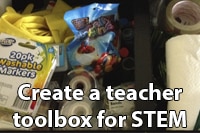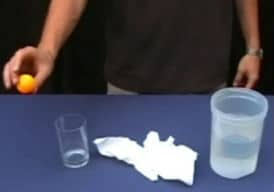
Create a toolbox for STEM teaching
So, you planned on using your free school period to spend some time marking and maybe get some lesson planning done when suddenly you find out that there’s been a change of plan; one of your fellow teachers has been caught in traffic and there is absolutely no way their class can be covered without you stepping in. Maybe unrealistic? Ok, maybe the casual teacher who was called in to cover part of the school’s flu epidemic has now called in sick too and their replacement will be another hour away at best. What would you do? Now of course, it would be tempting to quickly find out what book the students are currently reading and set them a comprehension task, or you take them out to play sport or worse case there’s always the DVD player that’s free in the library… but isn’t this all predictable? Perhaps this might be the perfect time to consider rolling out that science experiment that you wish you had time to run with your own class!
Having a ‘quick grab box’ of ‘science materials can make the world of difference to any number of teaching scenarios. Imagine if you needed a quick reward for good student behaviour or that your planned lesson ran much shorter than you expected and now you’ve got 30 students to keep occupied for the next 30 minutes until bell time. Storing away some non-perishable items in a plastic box does wonders for when you need to produce an engaging lesson at short notice. This idea has long been advocated by experienced casual science teachers as they know full well they don’t always arrive at a school with everything setup for them and now need to control Year 9 for a double period!

Teach about air pressure easily
Materials you need for your classroom science kit
- Balloons
- Wooden kebab sticks
- Plastic straws
- Nylon string
- Paper
- Scissors
- Matches
- Candles
- Stapled tea bags
- Water bombs
- Bicarbonate soda
- A small bottle of vinegar
- Salt
- Funnel
- Ping pong ball
- Blue Tac
- Tissues
- Rice
- Flat, shallow plates
- Food colouring
- 1 small plastic Cola bottle with lid
- Plastic Zip Loc bags
- 8mm metal nuts
- Small bottle of detergent
- Magnet
- Pipecleaners
- Needle
- Plastic cup
- Sticky tape
- Photographic film canister (you can still get these from eBay!)
- Skittles
- Sugar
You might be wondering at this point what on Earth you might do with the above science materials?
Well, you could use a combination of the above materials to run every one of the science experiments listed below:
- Fill a balloon with carbon dioxide
- Make a milk rainbow (just grab some full cream milk from the staff room fridge)
- Film canister rocket
- Make a volcano
- Balloon and nut hummer
- Make a straw flute
- Sticky static balloons
- Make a simple compass
- Balloon survives the flame
- Air takes up space demonstration
- Upside-down water cup experiment
- Bernoulli balloon blow apart experiment
- Skewer a balloon
- Impossible puff
- Ping pong on a string
- Soap powered boat
- Tea bag rocket
- Make a lung model
- Make different coloured petals (you just need to collect some white flowers)
- Geometric bubble films
- Make a mobius strip
- Demonstrate friction using rice
- Skittle science!
Without a doubt, there would be some readers who could look at the list of materials above and add even more science experiments to the list too! Just even having half of these materials on-hand will be a great back-up in case your actual lesson doesn’t turn out the way you wanted at the very least. Lets be honest, you won’t often need to access these science materials but you’ll find it nice to know that they are there in your cupboard for when you need it. The materials don’t have to be groundbreaking as sometimes even the most simple things can explain important concepts. For example, have a look at the two videos below!
How to turn a cup of water upside down with no spills
Demonstrate friction using rice
How is easy is that 🙂
You’ll find that most of the materials are hanging around your school anyway and the rest can picked up at the shops quite easily. The best bit is that nearly all the materials are re-usable, which means that the act of creating your ‘STEM go to box’ effectively means you’ve saved time in the long run in future lesson plans. Given just how many science experiments you can create from these materials you’ll have several days of science lessons on hand and the students certainly will thank you for not making them watch yet another episode of that tired documentary!
Happy teaching,
























Comments